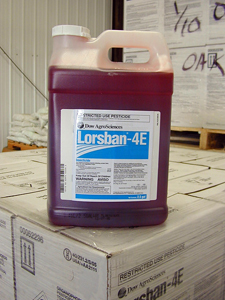 |
EPA management first approved the organophosphate insecticide chlorpyrifos for use in conventional agriculture based on data from the pesticide industry declaring its safety. EPA scientists later determined chlorpyrifos is linked to lower IQs and levels of gray matter in children exposed prenatally, and the Ninth Circuit Court of Appeals ordered the EPA to ban the toxin. EPA administrators under Trump have appealed the order.
Chlorpyrifos continues to be sprayed widely on conventionally grown produce, including apples, broccoli, oranges, strawberries, corn, and wheat. (Over half of all broccoli and apples in the United States are sprayed with chlorpyrifos.)
As politics around pesticides rage, DowDuPont, the primary chemical manufacturer of chlorpyrifos, has been found to disproportionately contribute to campaigns of lawmakers who have not signed on to a 2019 pesticide ban that would ban chlorpyrifos.
The best way to avoid exposure to this harmful pesticide and many others is to eat an organic diet. Chlorpyrifos is prohibited in organic agriculture.
DowDuPont Giving Generously To Congressional Opponents of Chlorpyrifos Ban
MapLight
by Frank Bass
Lawmakers who are sitting out a fight to ban a controversial pesticide linked to brain damage in children and farmworkers have received about 27 times more campaign cash from its primary manufacturer since 2017 than House members pushing for a prohibition on chlorpyrifos.
Ten of the 107 cosponsors of the Ban Toxic Pesticides Act of 2019 reported receiving $14,000 in campaign contributions since 2017 from the Midland, Mich.-based DowDuPont Inc. Federal Election Commission records show 118 of the 330 congressmen who haven’t sponsored the measure received $379,651 from Dow during the same period.
The disparity underscores the high stakes at issue in the long-running battle between environmentalists and Dow, a major corporate ally of the Trump administration that reported almost $86 billion in sales last year. Although the Environmental Protection Agency decided to ban chlorpyrifos for residential use in 2000because of its potential danger to children, the remaining uses of the pesticide have been at the center of legal battles since 2007, when a coalition of farmworkers and environmentalists filed suit to ban it completely.
Rep. Nydia Velazquez, the New York Democrat who sponsored a similar measure during the last session of Congress, said it’s “unconscionable for EPA to turn a blind eye as children and workers are exposed to this poison. If the EPA won’t do its job when it comes to chlorpyrifos, then Congress needs to act — and do so quickly.”

